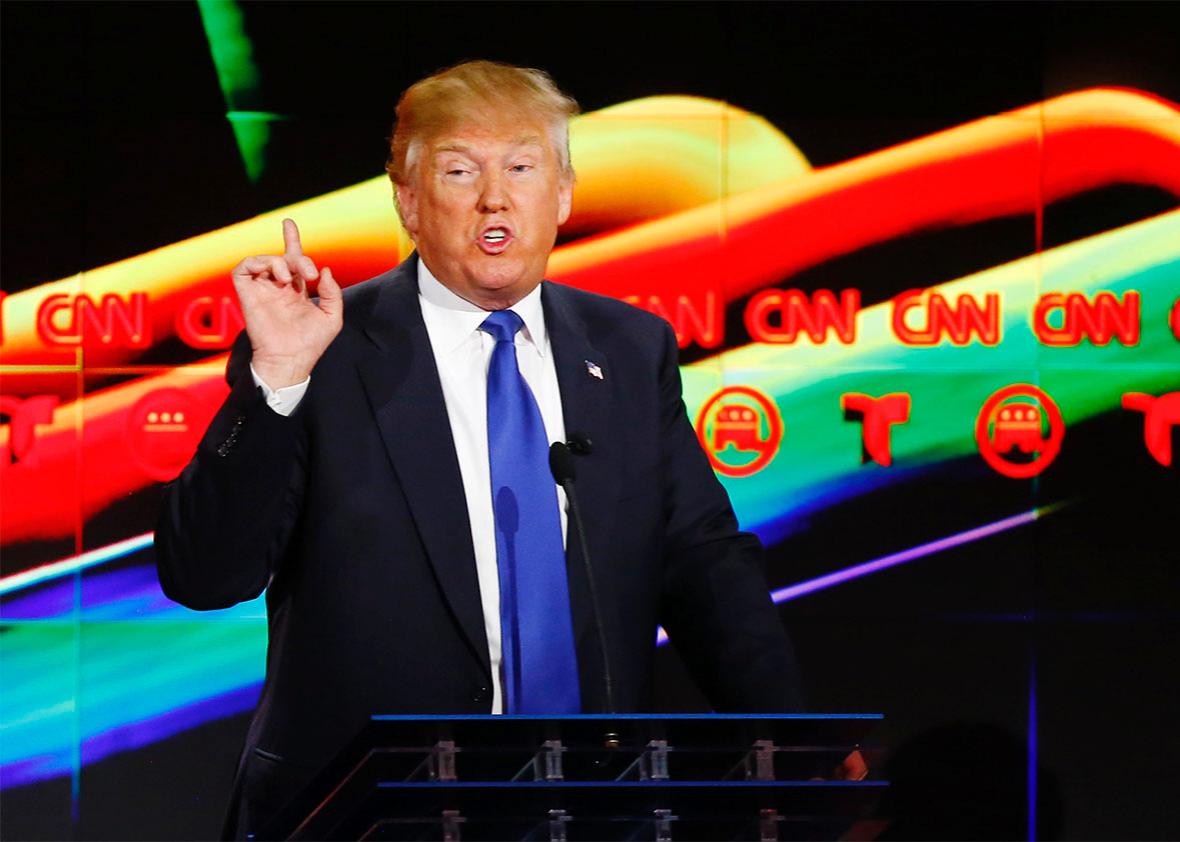In Thursday night’s Republican debate, Donald Trump committed a number of heresies against conservative movement orthodoxy. He suggested he’d be even-handed in dealing with the Israel-Palestine conflict. He came out against letting people die in the streets for lack of health care. He said America would be better off if Saddam Hussein were still in power. And, after Marco Rubio hit Trump for his past defense of Planned Parenthood, he offered qualified praise for the right’s great Satan. “Millions and millions of women—cervical cancer, breast cancer—are helped by Planned Parenthood,” Trump said. “So you can say whatever you want, but they have millions of women going through Planned Parenthood that are helped greatly.”
Now, Trump still said he’d defund Planned Parenthood because it does abortions. The internal logic of his position is in some ways crueler than that of his opponents, who don’t concede that they’re willing to take care away from millions of women. But it sounds more moderate, and it has made many conservatives furious. “Maybe it is those years of allegedly dealing with the mob, but Donald Trump again took to the stage and praised a group of murderers called Planned Parenthood,” wrote right-wing radio host and pundit Erick Erickson. “That organization chops up children, sells their body parts, and Donald Trump thinks they are wonderful.”
This is not, of course, the first time that Trump has said nice things about the reproductive health care giant. In August, he told Sean Hannity—correctly—that abortion is “actually a fairly small part of what they do,” and that Planned Parenthood also provides other crucial health services. “We have to help women,” Trump said. “We have to look at the positives.” Then, on Sunday’s Meet the Press, Trump said, “Look, I understand and I have many, many friends who are women who understand Planned Parenthood better than you or I will ever understand it, and they do some very good work: cervical cancer, lots of women’s issues, women’s health issues are taken care of.”
Both Rubio and Ted Cruz seem to think they’ll be able to make Trump pay for this. I’m not so sure. As Jamelle Bouie points out, Trump doesn’t draw his support from doctrinaire conservatives—the people who’ve made Planned Parenthood the center of their political demonology. The anger of Trump’s base is less ideological, rooted in inchoate racial grievance and, crucially, declining material circumstances. As the Guardian reported: “Analysis of recent polling and elections survey data indicates that while his base is broad, its members tend, overall, to be older, whiter, poorer, less conservative, less well-educated and, going by past voting records, less likely to turn out than supporters of rival candidates.”
The poorer part is important here. If you need a birth control prescription or a gynecological checkup and you don’t have good health insurance, you go to Planned Parenthood. It’s there for you even if you think that Barack Obama is a Muslim who was born in Kenya and that immigrants are destroying the economy. Planned Parenthood claims that 1 in 5 American women has received care at one of its clinics, and though that figure has been disputed, Trump is right that it’s helped millions of women. There is a reason why, despite the relentless propaganda against it, a recent Gallup poll found that 59 percent of Americans view Planned Parenthood favorably. Thirty-five percent of Republicans continue to think well of the organization. A survey commissioned by Planned Parenthood last year found that 50 percent of Republicans in Ohio and 46 percent in Pennsylvania opposed efforts to defund the organization.
Further, polling only tells us so much about voters’ real relationship to Planned Parenthood. There is almost certainly some population of downwardly mobile white voters who hear about how terrible Planned Parenthood is on Fox News and talk radio, and who are generally part of an anti-liberal cultural matrix, but who nevertheless rely on the organization for reproductive health care. My guess is that they feel conflicted and even ashamed. And a big part of Trump’s power lies in his ability to make his supporters feel exonerated.
Trump’s backers celebrate him for saying what they really think but are afraid to articulate. They’re usually talking about his willingness to traffic in unvarnished bigotry, which they see as a blow against stifling political correctness. Part of the reason that this resonates is because people hate feeling guilty. Trump tells them that there’s no shame in their suspicions and resentments and rage. At the same time, he gives voice to something that jingoistic nationalists know but haven’t been able to say aloud: that America, far from being No. 1 in all things, is actually kind of a mess.
A similar permission structure could be at work when Trump says that Planned Parenthood does good things. He outrages people like Erickson, but he resolves the conflict of right-leaning voters who actually need Planned Parenthood’s services. Yes, he still says he’s going to defund it, but he doesn’t make its clients feel like they’re complicit in something monstrous. We know that Trump has revealed the chasm between elite Republicans and many grassroots voters. Maybe he’s also showing us the social distance between those for whom Planned Parenthood is an abstract symbol of evil, and those for whom Planned Parenthood is a doctor’s office that will always see them.
